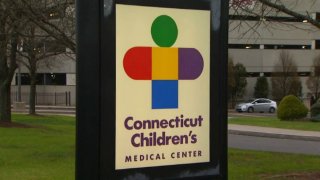
Connecticut Children's is offering a COVID-19 hotline for parents and community pediatricians with questions about the pandemic.
The hotline, which launches Thursday at 8 a.m., will offer a direct connection to a Connecticut Children's clinician 24/7. The hotline number is 1-833-226-2362.
The hotline will be able to give answers to general questions and also help parents determine if they need to see a specialist or go to an emergency room.
"It is important parents get the answers they need regarding their children, when they need it,” said Dr. Juan Salazar, physician-in-chief and Infectious Disease specialist at Connecticut Children’s.
The hospital has also launched a Coronavirus Information Center on its website: www.connecticutchildrens.org/coronavirus , which includes a dedicated section for healthcare providers.
According to the Centers for Disease Control and Prevention, children do not appear to be at higher risk for COVID-19, and in general, children with confirmed cases of COVID-19 saw mild symptoms.
Coronavirus Symptoms
The key symptoms of the coronavirus, according to the CDC are:
- Fever
- Cough
- Shortness of breath
Symptoms can appear in infected persons two to 14 days after exposure.
Coronavirus Prevention Steps
Steps for prevention from the CDC include:
- Avoid close contact with people who are sick.
- Avoid touching your eyes, nose, and mouth.
- Stay home when you are sick.
- Cover your cough or sneeze with a tissue, then throw the tissue in the trash.
- Clean and disinfect frequently touched objects and surfaces using a regular household cleaning spray or wipe.
- Cover your mouth and nose with a cloth face cover when around others
- You could spread COVID-19 to others even if you do not feel sick.
- Everyone should wear a cloth face cover when they have to go out in public, such as to the grocery store
- Coverings should not be placed on children under 2, anyone who has trouble breathing or is unconscious, incapacitated or otherwise unable to remove the mask without assistance.
- The face cover is meant to protect other people in case you are infected
- Do NOT use a facemask meant for a health care worker
- Wash your hands often with soap and water for at least 20 seconds, especially after going to the bathroom; before eating; and after blowing your nose, coughing, or sneezing.
- If soap and water are not readily available, use an alcohol-based hand sanitizer with at least 60% alcohol. Always wash hands with soap and water if hands are visibly dirty.
Steps to Self-Monitor for Coronavirus
Steps to self-monitor from the CDC include:
- Take your temperature with a thermometer two times a day and monitor for fever. Also watch for cough or trouble breathing.
- Do not take public transportation, taxis, or ride-shares during the time you are practicing social distancing.
- Avoid crowded places (such as shopping centers and movie theaters) and limit your activities in public.
- Keep your distance from others (about 6 feet or 2 meters).
If you do get sick with a fever, cough or have trouble breathing, call ahead before you go to a doctor’s office or emergency room and communicate with your doctor about your recent travel.
- If you develop symptoms, stay home and avoid contact with others. Do not go to work or school for this 14-day period. Discuss your work situation with your employer before returning to work.
The CDC has a special website set up with details about the coronavirus, including how it spreads and treatment.
Anyone with questions relating to coronavirus can call 2-1-1 or text "CTCOVID" to 898211. The 2-1-1 hotline is available 24 hours a day.
You can also visit the state's coronavirus information website here. Residents are encouraged to check the website for answers to questions before calling the hotline.

